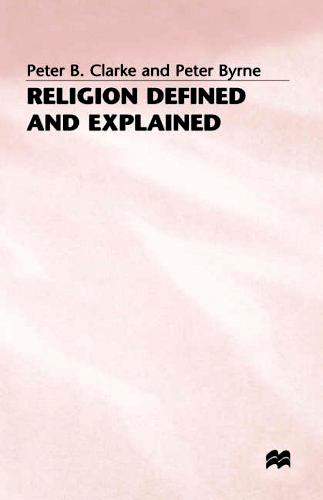
![]()
'Religion Defined and Explained' by Professor Peter B. Clarke & Professor Peter Byrne (1993), King's College, London (University of London).
Synopsis:
Examining a selection of major types of theory explaining religion - religious, philosophical, sociological, socio-economic and psychological - this book treats the presuppositions behind such theories and the grounds of their necessity and validity. It looks at major styles in the definition of religion. The book also argues that the case for making religion the subject of large-scale theorizing has not been made and contends that the explanation of religion proceeds better by concentrating on the specifics of religious history and the interconnections between religious ideas. Peter B. Clarke is also the author of 'Islam In Modern Nigeria', 'Religion and the Study of Religion Old and New' and 'West Africa and Islam' and the editor of 'Islam'. Peter Byrne is the co-editor of the journal 'Religious Studies'.
From 'Introduction':
It is characteristic of nineteenth and twentieth century approaches to the study of religion that they gave rise to large scale theories of religion. The aim of this study is to survey and appraise a selection of these theories and the intellectual enterprise that lies behind them. Five major forms of theory are covered: religious, philosophical, socio-economic, sociological and psychological. In the course of discussing these theories we consider two aims in drawing up a definition of religion, either to produce an operational definition or an essentialist one. Among the major forms of definition of religion examined are: substantive, functionalist, experiential, and family resemblance.
What is characteristic of large-scale theories of religion (leaving aside religious theories considered in Chapter 4) is their comprehensive and radical nature. They tend to be comprehensive in endeavouring to explain religion as a whole. They do not seek to add to our explanatory understanding of religion merely by making more of the facts about particular religions known, nor by interpreting specific religious phenomena. They tend to seek in contrast an explanation of religion as such. They provide answers to the question of why the very phenomenon or institution of human religion exists at all. They wish to offer an interpretation and explanation of this entire facet of human life. Why should they seek these ends? The relevant assumption which justifies such large-scale theorising appears to be that there is something problematic about the very existence and meaning of the facet of life we know as human religion. Something about the typical pattern of beliefs and behaviour we call religion makes the thinkers we consider question why it should exist at all and question its overall meaning and purpose.
In having these large-scale aims, and these kinds of background assumptions, such theories tend to be radical in their thrust. The radicalness of large-scale theories of religion is something that we define in detail in Chapter 3. Granted the assumption that there is something problematic about why religion exists at all, it is tempting to explain religion by showing how it is caused by something external to itself. 'Explaining religion' tends to become synonymous with outlining a psychological or social mechanism which causally generates religious belief and behaviour. The assumptions that lie behind the search for such a mechanism, and the endeavour to show that religion is sufficiently explained by tan external cause, or their very nature undermine the fundamental beliefs of the various religions. The inner logic of these explanations is to debunk and dismiss the assumptions that religious beliefs have a real reference to non-mundane states and entities, and that religious life is in part the outcome of human commerce with such transcendent, sacred realities.
Radical and comprehensive theories generate in addition special demands on the business of defining religion. Piecemeal and tentative attempts to give the word 'religion' a useable sense by summing up in a definition some of the salient and characteristic features of members of the class of religions are not enough. A grand theory of religion seeks some core, essential unifying feature or features of religion. It must do so, on pain of otherwise admitting that there is no uniform class of things called 'religions' which all require explanation, and the same explanation at that.
![]()
 Links to other sites on the Web
Links to other sites on the Web
 Professor Peter B. Clarke - Home Page
Professor Peter B. Clarke - Home Page
 Back to PBC's Main Publications List
Back to PBC's Main Publications List
 King's College, London - Dept of Theology & Religious Studies
King's College, London - Dept of Theology & Religious Studies
Peter B. Clarke & Peter Byrne
Hardback: 216 pages
ISBN: 0-333-53841-2
Categories: Religion & Spirituality, Society, Politics & Philosophy
Published by MacMillan Press Ltd., Hampshire, London & New York (1993)
Professor Peter B. Clarke - Official Website:
http://uk.oocities.com/peterbernardclarke
Copyright © 2006 Peter B. Clarke. All rights reserved.